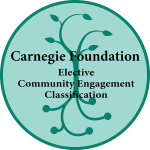Carnegie Foundation selects University of Indianapolis for 2020 Community Engagement Classification

The Carnegie Foundation has announced that the University of Indianapolis is one of the 119 U.S. colleges and universities to receive the Carnegie Community Engagement Classification, an elective designation that indicates institutional commitment to community engagement.
 This important classification is awarded following a process of self-study by each institution, which is then assessed by a national review committee led by the Swearer Center for Public Engagement at Brown University, the administrative and research home for the Carnegie Community Engagement Classification.
This important classification is awarded following a process of self-study by each institution, which is then assessed by a national review committee led by the Swearer Center for Public Engagement at Brown University, the administrative and research home for the Carnegie Community Engagement Classification.
“These newly-classified and re-classified institutions are doing exceptional work to forward their public purpose in and through community engagement that enriches teaching and research while also benefiting the broader community,” noted Mathew Johnson, executive director of the Swearer Center.
“We are proud of this national recognition of the university’s enduring commitment to our motto, ‘Education for Service.’ The University of Indianapolis remains dedicated to connecting our students with opportunities for personal and professional growth that enrich their communities throughout their lives,” said Robert L. Manuel, University of Indianapolis president.
Of the 119 institutions classified in the 2020 cycle, 44 are receiving the classification for the first time while 75 are now re-classified, after being classified originally in 2010 or 2015. These 119 institutions join the 240 institutions that earned the classification during the 2015 selection process, for a total of 359 campuses who are currently active holders of this important designation. Among the 2020 recipients of the classification, 67 are public institutions and 52 are private. For Carnegie’s Basic Classification, 52 are classified as research universities, 39 are master’s colleges and universities, 22 are baccalaureate colleges, 3 are community colleges, and 3 institutions have a specialized focus—arts, medicine, and other health professions. They represent campuses in 37 states and U.S. territories.
The Carnegie Community Engagement Classification has been the leading framework for institutional assessment and recognition of community engagement in U.S. higher education for the past 14 years with multiple classification cycles in 2006, 2008, 2010, 2015 and 2020.
“We also note that many more institutions who are not receiving classification today are doing similar important work and we celebrate them as well,” Johnson added. “It is clear that many campuses are facing difficult times and finding it challenging to maintain and advance their community engagement in the current climate. It is our hope that by celebrating these classified campuses others might come to see community engagement as part of the strategy to address the current set of challenges in higher education.”
About the University of Indianapolis
The University of Indianapolis, founded in 1902, is a private university located just a few minutes from downtown Indianapolis. The University is ranked among the top National Universities by U.S. News and World Report, with a diverse enrollment of nearly 6,000 undergraduate, graduate and continuing education students. The University offers a wide variety of study areas, including 100+ undergraduate degrees, more than 40 master’s degree programs and five doctoral programs. More occupational therapists, physical therapists and clinical psychologists graduate from the University each year than any other state institution. With strong programs in engineering, business, and education, the University of Indianapolis impacts its community by living its motto, “Education for Service.” Learn more: uindy.edu.
About the Carnegie Foundation for the Advancement of Teaching
The Carnegie Foundation for the Advancement of Teaching aims to build a field around the use of improvement science and networked improvement communities to solve long standing inequities in educational outcomes. The Foundation, through the work of the Carnegie Commission on Higher Education, developed the first typology of American colleges and universities in 1970 as a research tool to describe and represent the diversity of U.S. higher education. The Carnegie Classification of Institutions of Higher Education (now housed at Indiana University Bloomington’s Center for Postsecondary Research) continues to be used for a wide range of purposes by academic researchers, institutional personnel, policymakers and others. For more information, visit www.carnegiefoundation.org/.
About the Swearer Center for Public Service
In 1986, Brown University President Howard Swearer founded one of the first public service centers in the nation, now named for him — the Swearer Center for Public Service. The Swearer Center is a hub of community, scholarship, and action at Brown University. Through innovative programs and fellowships that reach across Rhode Island and around the globe, the Swearer Center connects people to co-create knowledge and positive social change, advances the field of engaged scholarship, and integrates social innovation with community engagement. In 2017, the Swearer Center became the administrative and research home of the Carnegie Community Engagement Classification.
